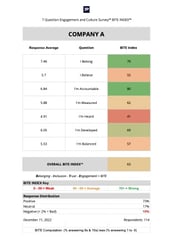As owners and founders, If we could have things our way, our employees would gladly give at least 70 hours per week to the business, just like us, and they would do it with perpetual smiles on their faces.
Obviously, this isn’t a realistic expectation, but there is a chance that you have one or two employees that are able to devote vast quantities of time and enthusiasm to your organization on a routine basis. Is it reasonable to judge the rest of your employees against the standard set by a few high performers, or is there something absent from the lives of your most devoted employees that permits them to contribute hours to your venture that others are incapable of matching?
These are the sorts of questions that you can ask your employees directly if your business is equipped with a vehicle - like a seasonal conversation - through which you can converse with your employees directly and learn about the ongoing events of their lives, and how those events might influence their capacity for work.
For example, if one of your high performers is pregnant or has a pregnant spouse, chances are they will be incapable of maintaining their lofty output during this time. On the flip side, if the surge in your other high performer’s productivity is the result of a death in the family, or some other difficulty at home that they are attempting to avoid dealing with, this is an unhealthy coping strategy that is going to be detrimental to the employee in the long run, and that is going to be unsustainable. Conversing with your employees regularly can help you get a firm grasp on what they are dealing with in their private lives, and more importantly for your purposes, what those employees require from you in order to support them.
One of the key takeaways from these discussions with your employees will be the recognition on their part that you care about them as individuals. This recognition will breed trust between you and your workers, and it will also create the type of loyalty that will have your employees willing to bust through walls for the sake of your organization.
We need to be crystal clear about what our expectations are for workers. If your organization will mandate that employees spend long hours at the office, then you should make your assumptions about their hourly workloads known from the outset. Otherwise, you are being unfair to your employees, and you are setting the stage for hurt feelings and departures. It sews the seeds of frustration that are likely to spread throughout your workforce.
One example trap I have heard new CPA firm employees complain about is that the firm tells them they have work-life balance, but, when the busy season comes and everyone is laying down 70 hour weeks, the new hire says: “Wait.. that is not what I understood.” They leave. The firms are in essence lying to get new employees.
On the other hand, work-life balance does not create a license for your employees to lay blame at your feet whenever workplace duties cause them to be mildly inconvenienced in their private lives. Yes, it is important that you have regular discussions with your employees to learn about happenings in their lives that might influence their work quality, either positively or detrimentally. By the same token, once you have made your honest expectations of your staff known, you are under no obligation to let them hold the forward progress of your company hostage as they sacrifice the caliber of their job performances for the sake of comfort in their personal lives.
Always remember, employment is an agreement obliging you and your employees to be on the same page with regard to the mission, values and activities of your organization, and the role your employees opt to play in accomplishing that mission. As long as you’ve been honest about the devotion level required to work in your company, you should not feel guilty about parting ways with those incapable of performing their duties as necessary.





